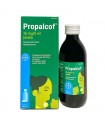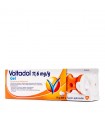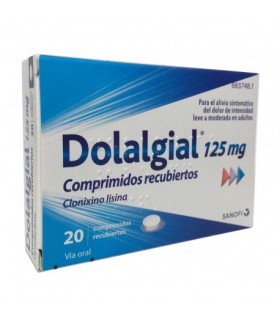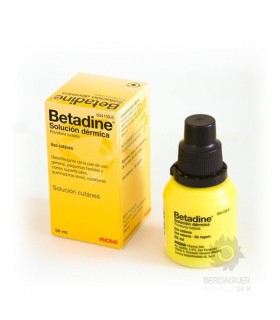It is an association of acetaminophen, chlorphenamine, and phenylephrine.
Acetaminophen is a pain-reducing pain and fever reliever.
Chlorphenamine is an antihistamine that relieves nasal discharge Phenylephrine is a sympathomimetic that reduces nasal congestion.
It is indicated in adults and adolescents over 15 years of age for the relief of symptoms of colds and flus that occur with fever or mild or moderate pain, congestion and nasal discharge.
You should consult your doctor if it gets worse or if it does not improve or if the fever persists for more than 3 days or the pain or other symptoms persist for more than 5 days.
ACTION AND MECHANISM
- Anti-flu.
* Paracetamol: analgesic and antipyretic, probably due to inhibition of cyclooxygenase at the central level, especially COX-2, decreasing the synthesis of prostaglandins.
* Chlorphenamine: H1 antihistamine and anticholinergic. Reduces catarral symptoms such as sneezing, tearing, or rhinorrhea.
* Phenylephrine: alpha-1 adrenergic agonist. It produces vasoconstriction, reducing nasal congestion.
SPECIAL WARNINGS
- In case the patient experiences difficulty urinating or urine retention it is recommended to stop treatment.
- Patients who are to be allergy tested with the use of allergenic extracts should discontinue treatment at least 72 hours before, to avoid false negatives.
Elderly
No specific problems have been reported in elderly people forcing a dosing readjustment.
However, these patients may be more sensitive to the side effects of this medicine, so it is advised to use it with caution, especially by monitoring the occurrence of anticholinergic effects.
PATIENT ADVICE
- Avoid drinking alcohol during treatment.
- Do not exceed recommended doses. Administration of other acetaminophen drugs could lead to very serious poisoning.
- Consult your doctor and/or pharmacist if the pain continues after 5 days of treatment, the fever lasts for more than 3 days, or symptoms worsen or new ones appear.
- Avoid driving or performing activities that require your attention until you verify that treatment does not affect you negatively.
- Warn your doctor and/or pharmacist if you are going to have allergy diagnostic tests.
- Tell your doctor and/or pharmacist if you have any of these symptoms:
* Dry mouth, visual disturbances, constipation or inability to urinate.
Contraindications
- Hypersensitivity to any component of the medicine, including [ALLERGY TO PARACETAMOL]. Cross hypersensitivity reactions may occur between different antihistamines.
- Pathologies that may be aggravated by this medicine, such as [ARTERIAL HYPERTENSION], [FEOCROMOCITOMA], [HIPERTIROIDISM], [CARDIOPATIA ISQUEMICA], [TAQUICARDIA], [GLAUCOMA] or [DIABETES].
- Severe renal impairment (ClCr < 30 ml/min) or severe hepatic impairment (Child-Pugh class C).
- [PORFIRIA]. H1 antihistamines have been associated with the onset of porf viral outbreaks, so they are not considered safe in these patients.
- Patients receiving IMAO within 14 days (see Interactions; antidepressants).
- Treatment with beta-blockers or other sympathomimetics.
DRIVING EFFECTS
It can produce important sedation due to the presence of chlorphenamine. Patients should avoid handling hazardous machinery, including automobiles, until they are reasonably certain that drug treatment does not adversely affect them.
Pregnancy
Animal safety:Phenylephrine was associated with increased fetal mortality and premature delivery in coneja, as well as decreased blood flow to the uterus in sheep.
Studies with acetaminophen in animals have not shown cases of malformations or fetotoxic effects.
Human safety :adequate and well-controlled human studies are not available. Administration is only accepted if there are no safer therapeutic alternatives, and the benefits outweigh the potential risks.
Effects on fertility :no specific human studies have been conducted.
Indications
- Symptomatic treatment of [COMMON COLD] or [GRIPE] with mild or moderate pain, fever, congestion and nasal discharge in adults and adolescents from 15 years of age.
Interactions
- Ethyl alcohol. Ethyl alcohol may enhance the sedative effects of this medicine. In addition, intake of alcoholic beverages along with acetaminophen may cause liver damage. It is recommended to avoid alcohol intake during treatment. In chronic alcoholics, no more than 2 g/24 hours of acetaminophen should be administered.
- Alpha blockers (anti-migraine ergotamines, oxytocin). Simultaneous use is not recommended because an increase in vasoconstrictor effects may occur. Alpha antihypertensive blockers or benign prostate hyperplasia, by not blocking beta receptors can cause an increased risk of hypotension and tachycardia.
- Inhaled anesthetics (halotane). They may increase the risk of arrhythmias.
- Oral anticoagulants. In very rare cases, usually at high doses, anticoagulant effects could be potentiated by inhibiting hepatic synthesis of coagulation factors by acetaminophen. It is recommended to administer the minimum dose, with as short a duration of treatment as possible, and to monitor the INR.
- Anticholinergics (antiparkinsonians, tricyclic antidepressants, IMAO, neuroleptics). Chlorphenamine could potentiate anticholinergic effects, so it is recommended to avoid association.
- Oral contraceptives. They could increase plasma clearance of acetaminophen, decreasing its effects.
- Tricyclic antidepressants (amitriptyline, amoxapine, clomipramine, desipramine, doxepine, maprotyline). Its simultaneous use may enhance the imprisoning effects of phenylephrine.
- Antihypertensives (beta blockers, diuretics, guanetidine, methyldopa). Phenylephrine could antagonize antihypertensive effects, and even lead to hypertensive seizures, so it is recommended to monitor blood pressure. Propranolol could inhibit the metabolism of acetaminophen, leading to toxic effects.
- Atropine. It blocks reflex bradycardia caused by phenylephrine and increases the presora response to phenylephrine.
- Active coal. It can produce an adsorption of acetaminophen, decreasing its absorption and pharmacological effects.
- Chloanfenicol. The toxicity of chloanphenicol could be enhanced, probably by inhibiting its metabolism.
- Digital. The risk of phenylephrine-associated cardiac arrhythmias may be increased.
- Diuretics that can cause hypokalaemia (furosemide). Hypokalemia may be potentiate and can decrease arterial sensitivity to vasopressors such as phenylephrine.
- Nervous stimulants (amphetamines, cocaine, xanthines). Nerve stimulation could be enhanced, resulting in intense excitability.
- Thyroid hormones. An enhanced effects of both drugs may occur, with a risk of high blood pressure and coronary insufficiency.
- IMAO. IMAO could potentiate the effects of phenylephrine by inhibiting norepinephrine metabolism, increasing the risk of hypertensive seizures and other cardiac phenomena. It is recommended to avoid administration of this medicine in patients treated with IMAO within 14 days prior.
- Enzyme inductors. Medications such as barbiturates, carbamazepine, hydantoin, isoniazide, rifampicin or sulfinpirazone could induce acetaminophen metabolism, decreasing its effects and increasing the risk of hepatotoxicity.
- Lamotrigin. Acetaminophen could reduce serum concentrations of lamotrigin, resulting in a decrease in the therapeutic effect.
- Levodopa. Administration of levodopa together with sympathomimetics increases the risk of cardiac arrhythmias, so a decrease in the dose of the adrenergic agonist may be necessary.
- Metoclopramide and domperidone. They increase the absorption of acetaminophen in the small intestine, by the effect of these medications on gastric emptying.
- Probenecid. Increases the plasma half-life of acetaminophen by decreasing the degradation and urinary excretion of its metabolites.
- Ion exchange resins (cholestyramine). Decreased absorption of acetaminophen, with possible inhibition of its effect, by fixing acetaminophen in the intestine.
- Nitrates. Phenylephrine could antagonize the anti-anminous effects of nitrates, so it is recommended to avoid association.
- Sedatives (opioid analgesics, barbiturates, benzodiazepines, antipsychotics). Sedative effects could be enhanced.
- Sympathomimetics. A boost of side effects, both nervous and cardiovascular, can occur.
- Zidovudine. Although possible enhancing of zidovudine toxicity (neutropenia, hepatotoxicity) has been reported in isolated patients, there does not appear to be any kinetic interaction between the two medicinal products.
Breast feeding
Milk excretion:
- Paracetamol: small amounts (similar to maternal cp).
- Chlorphenamine: unknown. Other antihistamines do.
- Phenylephrine: limited excretion and reduced oral bioavailability.
The consequences it could have for the infant are unknown. It is recommended to avoid administration during lactation.
Children
It can be used in adolescents from 15 years of age at the same dose as in adults.
It is not recommended for use in children and adolescents < 15 years because doses of acetaminophen are not adjusted to this age.
RULES FOR PROPER ADMINISTRATION
- Envelopes: dissolve the contents of the envelope in half a glass of liquid, preferably water.
Food administration: can be taken with or without food.
Dosage
- Adults and adolescents > 15 years: 1 over/6-8 h. Maximum dose 4 envelopes/24 h.
- Children < 15 years: not recommended because the acetaminophen content is not adjusted to this age.
- Elderly: no specific dosage recommendations have been made. Use with caution.
Duration of treatment: consult with your doctor and/or pharmacist if symptoms continue for more than 3 days (fever) or 5 days (pain and other symptoms), or if new symptoms appear. Stop treatment when symptoms go away.
Forgetting doses: administer the missed dose as soon as possible, unless there is little time to go until the next dose. Administer the next dose at the usual time. Do not double the next dose.
POSOLOGY IN HEPATIC IMPAIRMENT
- Mild to moderate hepatic impairment (Child-Pugh classes A and B): maximum dose 3 envelopes/24 h, with minimum interval between doses of 8 h.
- Severe hepatic impairment (Child-Pugh class C): contraindicated.
POSOLOGY IN RENAL INSUFFICIENCY
It is not recommended as the acetaminophen content exceeds the recommended dose in these patients.
Precautions
- [RENAL INSUFFICIENCY]. In general, use in patients with renal impairment is not recommended, as a dosing readjustment is required that would not be possible with this medicine (see Dosage in renal impairment for more information).
- [HEPATOTOXICITY]. Paracetamol has been linked to hepatotoxicity phenomena when used at high doses (> 4 g/24 h) or for extended periods of time.
Assess their use in case of [HEPATICA INSUFFICIENCY], [HEPATITIS] or [CIRROSIS HEPATICA], as well as in patients with other risks of liver damage, such as [CRONICO ALCOHOLISM], [HIPOVOLEMIA], [DEHYDRATION] or [DESNUTRICION] with low glutation levels, or treated with other hepatotoxic drugs.
Doses of acetaminophen should not generally exceed 3 g/24 h.
Avoid administration of other medicinal products containing acetaminophen, as well as the consumption of alcoholic beverages during treatment.
- [SALICYLATE ALLERGY]. Patients allergic to acetylsalyclic acid do not usually have cross-hypersensitivity reactions with acetaminophen, but cases of mild bronchospasm have been reported, so caution is advised in case of [ASMA].
- Patients with pathologies that may be aggravated by anticholinergic or sympathomimetic effects, such as [STRESS], [INTESTINAL OBSTRUCTION], [HIATO HERNIA], [GASTROESOPHAGEAL REFLUX DISEASE], [PEPTICA ULCER] estenosant, [ULCERATIVE COLITIS], [HEART FAILURE], [ATHEROSCLEROSIS], [PERIPHERICAL ARTERIOPATIA], [ANEURYSM], [PROSTATIC HYPERPLASIA] or other causes of [URINARY RETENTION].
- Skin tests of hypersensitivity to allergenic extracts. Due to its antihistamine effects they could give false negatives in diagnostic tests using these extracts. It is recommended that you stop administration at least 72 hours before taking the test.
- Situations that could raise body temperature. Anticholinergic drugs may interfere with the body's thermoregulatory capacity, so they could promote heatstroke in patients exposed to extreme heat, especially the elderly, who perform intense physical exercise with inadequate clothing or hours, or in treatment with drugs such as diuretics or others that favor [DEHYDRATION].
ADVERSE REACTIONS
Adverse reactions are described according to each frequency interval, considered very common (>10%), common (1-10%), uncommon (0.1-1%), rare (0.01-0.1%), very rare (<0.01%) or of unknown frequency (cannot be estimated from the available data).
Acetaminophen RAM:
- Liver: rare [TRANSAMINASE INCREASE], [ALCALINA PHOSPHATASE INCREASE], [HIPERBILIRRUBINEMIA]; [HEPATOTOXICITY], with [ICTERICIA].
- Cardiovascular: rare [HIPOTENSION].
- Neurological/psychological: [MAREO], [DISORIENTATION], [EXCITABILITY].
- Genitourinarias: very rare renal disorders such as turbidity of urine and renal disorders; unknown frequency [SERICA CREATININE INCREASE], increased ammonia levels, [UREIC NITROGEN INCREASE].
- Allergic: very rare [HYPERSENSITIVITY REACTIONS], with symptoms from [EXANTEMATIC ERUPTIONS] and [URTICARIA] to [ANAFILAXIA].
- Haematological: very rare [THROMBOCYTOPENIA], [AGRANULOCYTOSIS], [LEUCOPENIA], [NEUTROPENIA], [HEMOLITIC ANAEMIA], [METAHEMOGLOBINEMIA]. Prothrombin time may be increased, although it does not seem significant.
- Metabolic: very rare [HIPOGLUCEMIA]; unknown frequency [LACTATE DEHYDROGENASE INCREASE].
- General: rare [GENERAL MALAISE].
Chlorphenamine RAM:
- Digestives: unknown frequency [NAUSEAS], [VOMITOS], [DIARREA], [STRESS], [ABDOMINAL PAIN], [DRY MOUTH].
- Hepatic: unknown frequency [HEPATITIS], [COLESTASIS].
- Cardiovascular: unknown frequency [PALPIITATIONS], [HIPOTENSION], [ARTERIAL HYPERTENSION].
- Neurological/psychological: unknown frequency [SOMNOLENCIA], [MAREO], [DISTONIA] facial, [ATAXIA], [TEMBLOR], [PARESTESIA], [DISGEUSIA], [PAROSMIA].
Paradoxical excitability reactions may occur in children and the elderly, with [AGITATION], [INSOMNIO], [NERVIOSISMO], [DELIRIO], [CONVULSIONES].
- Respiratory: unknown frequency [NASAL DRYNESS] or throat, [GARGANTA PAIN], thickening of mucus, [TORACIC OPRESION], [SIBILANCES].
- Genitourinarias: unknown frequency [URINARY RETENTION] or difficulty urinating, [SEXUAL IMPOTENCE], advancement of menstruation.
- Dermatological: unknown frequency [HIPERHIDROSIS].
- Allergic: unknown frequency [HYPERSENSITIVITY REACTIONS], with symptoms such as [TOS], [DYSPHAGIA], [TAQUICARDIA], [URTICARIA], [EDEMA] facial or [ANGIOEDEMA], [DYSPNOEA], [FATIGA]. Also [PHOTOSENSITIVITY REACTIONS].
- Osteomusculars: unknown frequency [MIASTENIA].
- Ophthalmological: unknown frequency [VISION BORROSA], [DIPLOPIA].
- Erotics: unknown frequency [TINNITUS], [LABERINTITIS].
- Haematological: unknown frequency [AGRANULOCYTOSIS], [LEUCOPENIA], [APLASIC ANAEMIA], [THROMBOCYTOPENIA], [HEMORRAGIA].
- Metabolic: unknown frequency [ANOREXIA].
- General: unknown frequency [FATIGA], [EDEMA].
Phenylephrine RAM:
- Digestives: unknown frequency [VOMITOS], [HYPERSALIVATION].
- Cardiovascular: unknown frequency [ARTERIAL HYPERTENSION], [HIPOTENSION], [RUBORIZATION], [BRADICARDIA], [TAQUICARDIA], [ANGINA DE PECHO], [PALPITATIONS], [CARDIAC STOP].
- Neurological/psychological: unknown frequency [CEFALEA], [CEREBRAL HEMORRAGIA], [VERTIGO], [MAREO], bottling.
- Respiratory: unknown frequency [DISNEA], [PULMONAR EDEMA].
- Genitourinarias: unknown frequency [HESITANT URINATION], [URINARY RETENTION].
- Dermatological: unknown frequency [HIPERHIDROSIS], [PARESTESIA].
- Metabolic: unknown frequency [HIPERGLUCEMIA], [HIPOGLUCEMIA].
- General: unknown frequency feeling cold on the skin.
ADVERSE REACTIONS RELATING TO EXCIPIENTS
- This medicine contains mannitol. Daily doses greater than 10 g may produce some mild laxative effect and result in [DIARREA].
Overdose
Symptoms: Overdose by acetaminophen products is very serious and potentially fatal poisoning. Symptoms may not develop immediately, and may even take up to three days to appear. These symptoms include confusion, excitability, restlessness, nervousness and irritability, dizziness, nausea and vomiting, loss of appetite and liver damage. Hepatotoxicity usually develops after 48-72 hours with nausea, vomiting, anorexia, discomfort, diaphoresis, jaundice, abdominal pain, diarrhea and liver failure.
In children there are also states of sopor and alterations in the way of walking.
In the most severe cases, the patient may die from hepatic necrosis or acute renal impairment.
The minimum toxic dose of acetaminophen is 6 g in adults and 100 mg/kg in children. Doses greater than 20-25 g of acetaminophen are potentially fatal.
In addition to symptoms of acetaminophen overdose, symptoms of chlorphenamine overdose (deep sedation, anticholinergic symptoms) and phenylephrine (excitability, seizures, tachycardia, high blood pressure) may occur.
Treatment: In case of overdose, you should go to a medical center immediately, as acetaminophen poisoning can be fatal, even if no symptoms appear. Early identification of acetaminophen overdose due to the severity of the picture, as well as possible treatment, is especially important in children.
In any case, gastric lavage and aspiration of stomach contents will be initially carried out, preferably within four hours of ingestion. Administration of active coal can reduce the amount absorbed.
There is a specific antidote in case of acetaminophen poisoning, N-acetylcysteine. It is recommended to administer a dose of 300 mg/kg N-acetylcysteine, equivalent to 1.5 ml/kg of 20% aqueous solution, with a pH of 6.5, intravenously, over a period of 20 hours and 15 minutes, according to the following scheme:
- Adults. A shock dose with 150 mg/kg (0.75 ml/kg solution at 20%) will initially be administered intravenously, for 15 minutes, either directly or diluted in 200 ml of 5% dextrose.
A maintenance dose with 50 mg/kg (0.25 ml/kg solution at 20%) will then be established. 500 ml of 5% dextrose in slow intravenous infusion for 4 hours.
Finally 100 mg/kg (0.50 ml/kg solution at 20%) 1000 ml of 5% dextrose in slow intravenous infusion for 20 hours.
- Children. The same amounts per unit weight as in the adult shall be administered, but dextrose volumes should be adjusted based on the child's age and weight in order to avoid vascular congestion.
The effectiveness of the antidote is maximum if administered within 8 hours of ingestion. Effectiveness decreases progressively thereafter and is ineffective from 15 hours.
Administration of N-acetylcysteine at 20% may be discontinued when blood acetaminophen levels are less than 200 mcg/ml.
In addition to the administration of the antidote, symptomatic treatment will be instituted, keeping the patient under clinical surveillance.
In the event of hepatotoxicity, it is recommended to conduct a liver function study and repeat the study at 24-hour intervals.




































